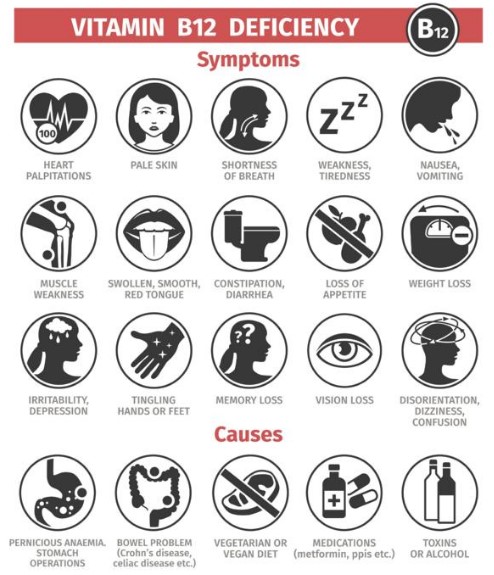Vitamin B12 being an essential nutrient which cannot be synthesized by the body holds special significance in our body physiology for multiple physiological processes. For vegetarians specially, with an increased vulnerability to low B12 levels, identification of deficiency signs and early management cannot be stressed enough.
Understanding Vitamin B12: What It Is and Its Role
Vitamin B12 or cobalamin is part of the greater B-vitamin family. Working together with vitamins D, A, and C, it sustains ideal functionality of the organism’s vitality. The presence of cobalamin is requisite for the synthesis of blood cells and bone marrow, effective control of blood cholesterol levels, and uttermost operation of the functioning of the nervous system. Next, the functioning of the life processes and human activities is only possible with the energy that cobalamin transforms into nutrients found in different molecules. Because our bodies cannot produce vitamin B12 on their own, it is important that we are able to get what we need through our diet or by taking dietary supplements.
Symptoms of B12 Deficiency
A deficiency in the said vitamin can be due to a deficiency in intake or inability of the body to absorb this vitamin. Such deficiency often leads to pernicious anemia, which a physician detects through the following signs and symptoms:
• Severe weakness, fatigue, and lethargy
• Very pale or pallid skin
• Neuropsychiatric changes such as irritability and depression
• Inability to pay attention
• Unintentional weight loss
• Shortness of breath
• Dizziness with periods
• Palpitations
• Hepatomegaly and splenomegaly
• Paresthesia or described having pricking or tingling sensation felt in the hands, arms, legs, and feet
• Tingling and or weakness experienced in the intervening hands and legs
• Weakness of the arms and legs
• Degree of muscle strength was decreased
The Relationship between Vitamin B12 deficiency and Migraine
Vitamin B12.
The Importance of Vitamin B12 in Athletes
Vitamin B12 is among the essential nutrients for athletes, as it plays an important role in the formation of red blood cells responsible for oxygen delivery to the muscles. The more the muscles are fatigued with exercise, the more they will need oxygen to be able to make an optimal return to performance. Besides, B12 helps derive glucose from the food which is a kind of sugar and the source of energy for the body. This is quite valuable to athletes whose sports activities rely heavily on them for non-stop energy. Vitamin B12 also plays a role in supporting the nervous system and can help avoid neurological degeneration due to the severity of athletic activities.
Sources of Vitamin B12
Vitamin B12 is mainly found in animal-based foods; therefore vegetarians have weak chances of acquiring this into their body. Major food sources for vitamin B12 are:
• Meat
• Liver
•Fish
•Shellfish
•
Remember that plant-based foods do not have vitamin B12 originally in them. In contrast to previous beliefs regarding the fact that some algae, such as spirulina, may contain this specific vitamin, additional research has concluded that all these algae contain a pseudo-vitamin B12, very little of which is biologically active in humans. Fermented soy products like tempeh and drinks like kombucha contain quite small amounts of vitamin B12, but not enough to give a considerable supply to the body.
Vitamin B12 and Vegetarian Diets
It is vegetarians and particularly the vegans who are at risk of suffering a vitamin B12 deficiency. A good and expert nutritionist is always recommended for proper diet formulation among vegetarians, together with close consideration for vitamin B12 supplementation. It is one of the very few nutrients that cannot be satisfied with only a strictly vegetarian diet. Supplementation is, therefore, a must for people consuming food free from animal products.
This article was originally published on vogue Read the original article.
FAQs
What are the best food sources of Vitamin B12?
The richest dietary sources for Vitamin B12 is of animal products like meat, fish, eggs, and milk products. For vegetarians and vegans, it must come from fortified foods or supplements.
How long does it take to reverse a deficiency in B12?
How long it takes to recover from B12 deficiency may take a few weeks or several noticeable significant improvement months, depending on the extent of the deficiency and the kind of treatment.
Does a B12 deficiency lead to any permanent damage?
Untreated severe deficiency of B12 may lead to permanent nerve damage and cognitive problems. Therefore, early diagnosis and treatment are especially important to avoid long-term damage.
Can you overdose on B12?
B12 supplements are safe in most cases. But in some rare conditions, overdose even on them may cause complications such as headache, nausea, and diarrhea. Please, always take supplements within the medical prescriptions.
How often should B12 levels be checked?
The frequency of checking B12 levels, however, should not be less than annual checks or as frequently as may be recommended by healthcare providers in at-risk individuals.
